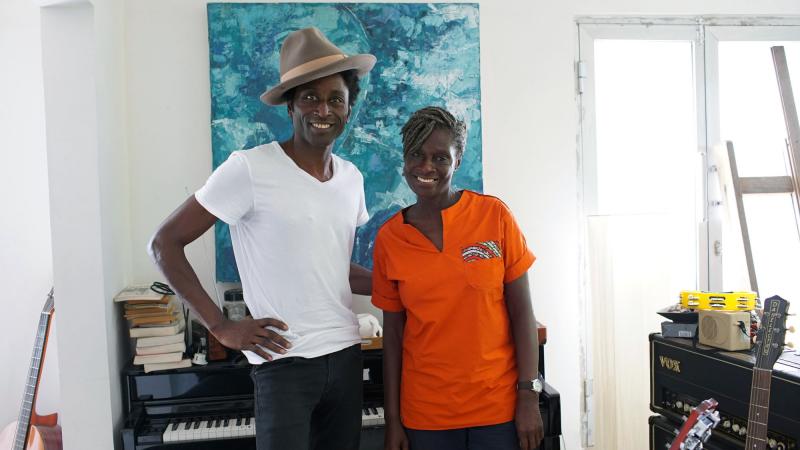Africa: A Journey Into Music, BBC Four review - too little, too late? | reviews, news & interviews
Africa: A Journey Into Music, BBC Four review - too little, too late?
Africa: A Journey Into Music, BBC Four review - too little, too late?
All around Nigerian music in just one hour

BBC Four is the TV music equivalent of those oldsters music mags like Q and Mojo. Have there been five, or is it six, documentaries about Queen on the channel?
The main difficulty, in the first episode, is that the idea of “doing” Nigerian music in an hour is in many ways absurd. Can you imagine an African documentary maker “doing” English music in an hour? What to cover? Music Hall, the Beatles, metal, grime, Britten with three minutes on each.
The presenter Rita Ray comes off well on screen, at all times a real enthusiast. Everything is “amazing” if not “bonkers". She has been an African music aficionado for decades, but doesn't really get to show off her knowledge and real insights into Nigerian music.
The result is at times a bit Auntyish and old fashioned – somewhat earnest discussions of the nature of polyrhythms included. There are several documentaries jammed into one hour. The most famous Nigerian musician of them all is Fela Kuti, who gets better known each passing year, with a recent musical to his name and Beyoncé doing covers. Although not big in Mojo/BBC Four world, his scorching “Zombie” from 1976 (the Zombies were the police and military) was a song that provoked riots and fierce retaliation from the authorities. It was, we can definitively say by now, at least as influential and revolutionary a track as “Anarchy In The UK” of the same year.
There are some great moments - including the strange Yoruba twins communing with the ancestors, the dancing white ibexes, but not enough
There are brief excerpts of what probably was a great interview with Fela's son Femi and some nice snippets of archive. But you suspect if Netflix did Fela they would probably do one of their five-hour documentary series as they have done of Rajneesh/Osho (Wild Wild Country) and Bobby Kennedy.
Meanwhile the upstart internet TV music channels like Vice or Boiler Room would more likely have focussed intently on one of the new Nigerian Afrobeats (with an s) pop stars who are sweeping the world. Rita Ray seems a bit uninterested in the likes of Davido, but does get a good interview with one of the band Bantu who thinks this new Nigerian music is thrilling because it places the music for the first time on a par with American music (with its collaborations with Kanye West and Diplo and the like) and says the “world music” route is at last not the only way to achieve international recognition.
Within Afribeats itself there are some great stories – like the relationship between D’Banj and Don Jazzy, for example – a great hit writing partnership and friendship that was torn asunder when D’Banj "the koko-master" relocated to the US. A tragicomedy and a soap opera. That would be a documentary worth seeing.
Rita Ray gets on well with, and charms most of the older artists like hi-life star Victor Owaifo (filmed in his eccentric mansion and museum – worth watching just for that) and she no doubt has a warm pre-existing relationship with some of the stars like Sunny Adé and Keziah Jones. The one Afrobeats star she coaxes a fascinating interview with is Tiwa Savage, and the strongest parts of the documentary are when she is chatting to female stars like her and singer-songwriter Nneka. Women musicians in Nigeria would be a good subject for Ray to make more films on.
As it is, this skates along the surface without enough sense of the epic, the transcendental, the power and sheer sexiness of the music or the struggles of the people, and is unlikely to really please world music or Afrobeats fans. There are some great moments, including the strange Yoruba twins communing with the ancestors, the dancing white ibexes, and the swagger of a motorcycling cop, but not enough.Thankful for small mercies? Not exactly.
rating
Share this article
Add comment
The future of Arts Journalism
You can stop theartsdesk.com closing!
We urgently need financing to survive. Our fundraising drive has thus far raised £49,000 but we need to reach £100,000 or we will be forced to close. Please contribute here: https://gofund.me/c3f6033d
And if you can forward this information to anyone who might assist, we’d be grateful.

Subscribe to theartsdesk.com
Thank you for continuing to read our work on theartsdesk.com. For unlimited access to every article in its entirety, including our archive of more than 15,000 pieces, we're asking for £5 per month or £40 per year. We feel it's a very good deal, and hope you do too.
To take a subscription now simply click here.
And if you're looking for that extra gift for a friend or family member, why not treat them to a theartsdesk.com gift subscription?

Comments
as an old capetonian my view